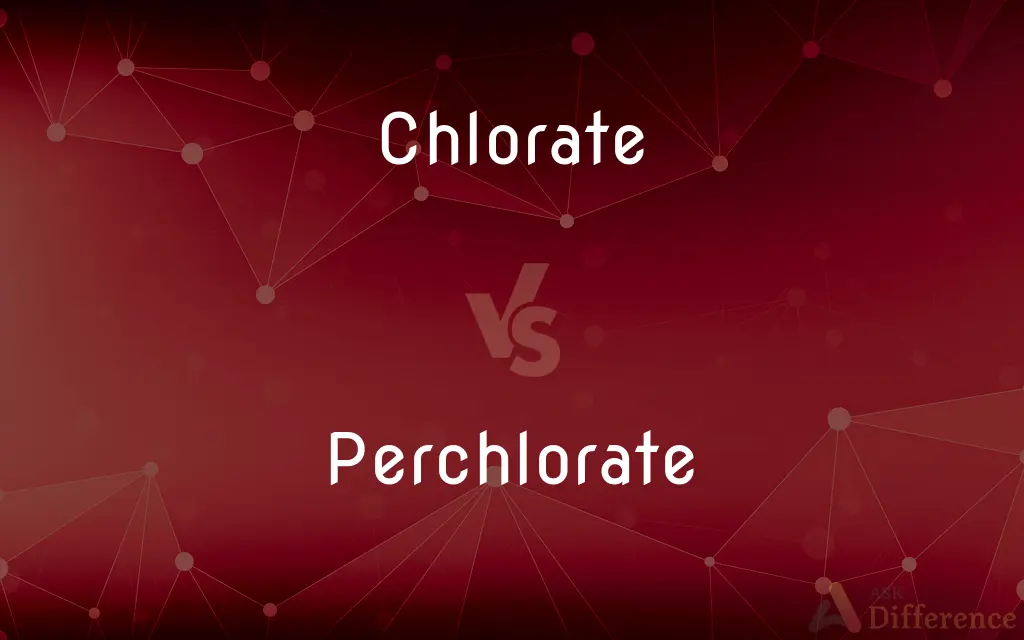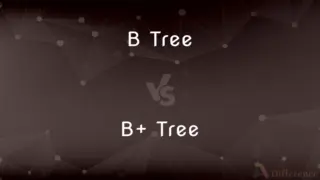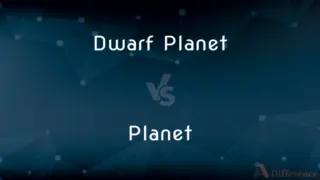Chlorate vs. Perchlorate — What's the Difference?
By Tayyaba Rehman — Published on November 10, 2023
Chlorate is an anion with the formula ClO₃⁻, often used in disinfectants. Perchlorate, ClO₄⁻, is similar but has an extra oxygen atom and is found in rocket propellants.

Difference Between Chlorate and Perchlorate
Table of Contents
ADVERTISEMENT
Key Differences
Chlorate and perchlorate are both anions derived from chlorine. While chlorate has the chemical formula ClO₃⁻ and consists of a chlorine atom bonded to three oxygen atoms, perchlorate possesses an additional oxygen, giving it the formula ClO₄⁻.
In applications, chlorates have historically been used in the production of disinfectants, herbicides, and explosives. Perchlorates, on the other hand, have garnered attention due to their presence in rocket propellants, given their powerful oxidizing capabilities.
The stability of these compounds varies. Chlorate is less stable than perchlorate, making it more prone to decomposition. This instability, especially under certain conditions, contributes to its potential use in explosives. Conversely, perchlorates tend to be more stable, though still reactive, especially as strong oxidizing agents.
Both compounds have raised environmental and health concerns. The presence of perchlorate in drinking water sources, for instance, has become a topic of debate due to potential health impacts. Chlorates, when consumed or absorbed in significant amounts, can similarly pose health risks.
In essence, while chlorate and perchlorate are chemically related, they vary in their structural composition, stability, applications, and potential impacts on health and the environment.
ADVERTISEMENT
Comparison Chart
Chemical Formula
ClO₃⁻
ClO₄⁻
Oxygen Atoms
Three
Four
Common Use
Disinfectants, herbicides, explosives
Rocket propellants, other explosives
Stability
Less stable
More stable
Health Concerns
Can be toxic when consumed in large amounts
Concerns when found in drinking water sources
Compare with Definitions
Chlorate
An anion derived from chlorine.
The presence of chlorate can be detected through specific chemical tests.
Perchlorate
An anion with the formula ClO₄⁻.
Perchlorate salts are known for their oxidizing properties.
Chlorate
A component found in some explosives.
The explosive nature of chlorate made it a significant ingredient in early pyrotechnics.
Perchlorate
A substance of environmental concern when present in water.
Some areas test drinking water regularly for perchlorate due to potential health risks.
Chlorate
A compound with the formula ClO₃⁻.
Sodium chlorate is a salt formed from sodium cations and chlorate anions.
Perchlorate
A compound containing a chlorine atom bonded to four oxygen atoms.
Potassium perchlorate is a common salt of the perchlorate ion.
Chlorate
A substance used in the production of disinfectants.
Chlorate-based disinfectants were historically popular for water treatment.
Perchlorate
An ingredient in rocket propellants.
The high oxidizing power of perchlorate makes it valuable for rocket fuels.
Chlorate
A compound that can act as an oxidizing agent.
Chlorate can donate oxygen in certain reactions, showcasing its oxidizing capability.
Perchlorate
A strong oxidizing agent.
Perchlorate can significantly accelerate combustion reactions.
Chlorate
The anionic univalent group ClO3 derived from chloric acid, or a compound containing this group.
Perchlorate
The univalent anionic group ClO4, derived from perchloric acid, or a compound containing this group.
Chlorate
(chemistry) Any salt of chloric acid.
Chlorates are powerful oxidizing agents.
Perchlorate
(chemistry) any salt of perchloric acid; used in pyrotechnics and as powerful oxidizing agents.
Chlorate
A salt of chloric acid; as, chlorate of potassium.
Perchlorate
A salt of perchloric acid.
Chlorate
Any salt of chloric acid
Perchlorate
A salt of perchloric acid
Common Curiosities
How does perchlorate differ from chlorate?
Perchlorate, ClO₄⁻, has an additional oxygen atom compared to chlorate and is commonly found in rocket propellants.
Is chlorate harmful?
In significant amounts, chlorate can be toxic and pose health risks.
Are chlorates used in fireworks?
Yes, chlorates have historically been used in fireworks due to their explosive nature.
Can chlorate act as an oxidizer?
Yes, chlorate can act as a strong oxidizing agent in certain reactions.
What is chlorate?
Chlorate is an anion with the formula ClO₃⁻, often used in disinfectants and explosives.
Are there health concerns with perchlorate ingestion?
Yes, there are concerns about perchlorate's impact on thyroid function if consumed in large amounts.
Are there regulations on perchlorate levels in water?
Yes, there are guidelines and regulations in many regions regarding permissible perchlorate levels in drinking water.
How can one differentiate between chlorate and perchlorate in a compound?
Chemically, chlorate contains three oxygen atoms while perchlorate has four.
Why are perchlorates used in rocket fuels?
Perchlorates are powerful oxidizing agents, making them ideal for accelerating combustion in rocket propellants.
What is the source of perchlorate in the environment?
Perchlorate can come from both natural sources, like certain mineral deposits, and human-made sources, like industrial activities and rocket propellants.
Are chlorate and perchlorate salts soluble in water?
Yes, many chlorate and perchlorate salts are highly soluble in water.
Are chlorates and perchlorates both oxidizers?
Yes, both can act as oxidizing agents, but perchlorates are generally stronger oxidizers than chlorates.
What's a common salt of chlorate?
Sodium chlorate is a widely recognized salt of chlorate.
Is the use of chlorate in agriculture common?
Historically, chlorate was used as an herbicide, but its use has declined due to safety concerns.
Why is the presence of perchlorate in water a concern?
Perchlorate in water can interfere with the thyroid gland, affecting hormone production and overall health.
Share Your Discovery

Previous Comparison
B Tree vs. B+ Tree
Next Comparison
Dwarf Planet vs. PlanetAuthor Spotlight
Written by
Tayyaba RehmanTayyaba Rehman is a distinguished writer, currently serving as a primary contributor to askdifference.com. As a researcher in semantics and etymology, Tayyaba's passion for the complexity of languages and their distinctions has found a perfect home on the platform. Tayyaba delves into the intricacies of language, distinguishing between commonly confused words and phrases, thereby providing clarity for readers worldwide.












































